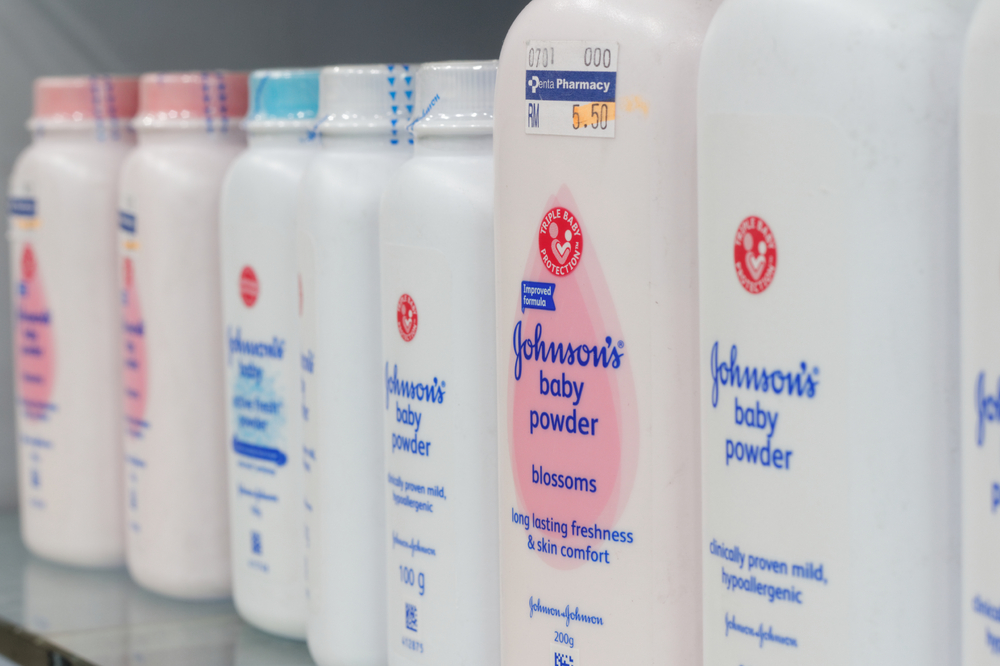
The huge pharmaceutical company, Johnson & Johnson, insists that its talc-based baby powder, sold for decades, is completely safe as long as it was used appropriately, despite the fact that it withdrew the product last year and has now had to settle more than a thousand individual lawsuits against it.
It has agreed to pay 100 million dollars to settle some of these lawsuits which alleged that the talc in the baby powder caused cancer.
Two types of cancer have allegedly been caused by talc-based health products
The majority of the lawsuits filed against the company, the world’s largest manufacturer of health products, were by women who alleged that prolonged use of the baby powder led to them developing ovarian cancer. A smaller number of lawsuits filed also alleged that the talc in the baby powder contained traces of asbestos which causes a more aggressive and dangerous cancer known as mesothelioma. Johnson & Johnson has refuted both allegations and insists that their product is not carcinogenic and does not contain asbestos, even though there is evidence that asbestos can be found in similar places to where the mineral talc is mined.
Johnson & Johnson recalled 33,000 bottles of baby powder last year without admitting liability. At the time they said that they were acting out of an “abundance of caution.” The talc-based baby powder is no longer available for sale in either Canada or the U.S. and has been replaced by a product that is based on cornstarch.
Other manufacturers of talc-based health products have also recently switched to using cornstarch rather than talc. The scientific evidence for the link between both ovarian cancer and mesothelioma and talc-based products has been contradictory. Johnson & Johnson may insist that the science backs up their refutation that their products are safe, but leaked communication coming from within Johnson & Johnson indicates that the company was aware that there were traces of asbestos in talc many years ago.
How much have talc manufacturers covered up its carcinogenic properties?
There is a similarity between a possible cover-up of potential health dangers from a widely used and promoted product by Johnson & Johnson with other well-known products used for years before successful legal action led to their removal from commercial use. In the last two years, there have been growing numbers of lawsuits aimed at the manufacturers of Zantac, a heartburn and GERD medication, and Monsanto’s Roundup, a weedkiller. It may also be recalled just how difficult it was for tobacco manufacturers to be brought to account the carcinogenic properties of substances contained in tobacco.
It has been estimated that Johnson & Johnson still faces around 20,000 lawsuits related to the use of talc and may be liable for as much as 10 billion dollars in compensation. Mesothelioma and asbestos-related lawsuits are expected to grow in number through the rest of 2020 and into the next few years as Johnson & Johnson tries to refute what evidence there is to link the use of their product with the deadly disease. It is notoriously difficult to definitively prove these biochemical links as it often takes years of exposure before cancerous conditions develop. The recall of baby powder last year followed a U.S. Food and Drug Administration (FDA) discovery of traces of asbestos in a single bottle of baby powder. Johnson & Johnson vehemently refuted the evidence and reported that they had tested the exact same bottle without detecting the presence of asbestos.
Mesothelioma lawsuits are not new, but in the past, they were mostly confined to workers in the mining and construction industries who had been exposed to asbestos dust during years of work. Now, lawsuits against talc manufacturers like Johnson & Johnson are growing in number with about 200 lawsuits expected to have been filed this year alone.
You have the right to sue a company if its product caused you to suffer
If you have a strong suspicion that your health has been seriously compromised by prolonged exposure to a talc-based product, you should contact the Diaz Law Firm as soon as possible to discuss your legal options in light of other recent and impending successful cases against Johnson & Johnson. You may have grounds to claim compensation.
For more information, you can download our FREE Talcum Powder & Ovarian Cancer e-book.